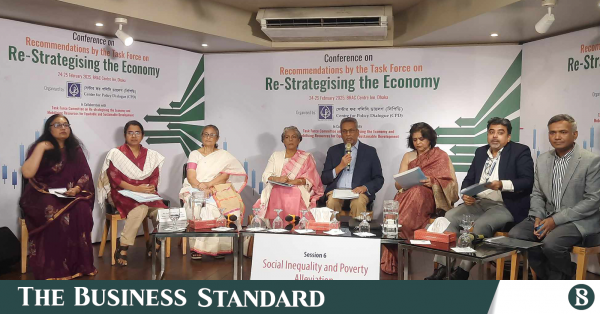Speakers at a conference on recommendations by the Task Force on Re-strategising the Economy, organised by the Centre for Policy Dialogue (CPD) in Dhaka on 25 February. Photo: TBS
“>

Speakers at a conference on recommendations by the Task Force on Re-strategising the Economy, organised by the Centre for Policy Dialogue (CPD) in Dhaka on 25 February. Photo: TBS
The top 10% of the population control 58.5% of total wealth, while the bottom 50% hold only 4.8%, said Dr Rumana Haque, a member of the task force on “Re-strategising the Economy and Mobilising Resources for Equitable and Sustainable Development”, today (25 February).
“The income inequality in the country has further increased, with the wealthy earning even more,” she said during a paper presentation at the Conference on Recommendations by the Task Force on Re-strategising the Economy, organised by the Centre for Policy Dialogue (CPD) in Dhaka.
Speaking during the session on “Social Inequality and Poverty Alleviation”, Dr Haque stressed the need for the government to revitalise the rural economy to reduce income disparity.
While industrialisation, infrastructure investment, and foreign direct investment (FDI) have primarily benefited urban areas, 85% of the workforce remains in low-wage, unprotected jobs, she said.
She added that poor-quality education in rural areas limits upward mobility, while VAT disproportionately burdens lower-income groups.
To address income inequality, she called for progressive taxation on wealth and inheritance, along with stricter compliance measures to prevent tax evasion and reduce wealth concentration.
She also emphasised the importance of expanding access to quality education, vocational training, and financial inclusion to support small and medium enterprises (SMEs), particularly for disadvantaged groups.
Strengthening welfare programmes, introducing universal basic income, enforcing fair wages, and supporting labour unions were also identified as crucial measures.
Sharmeen S Murshid, adviser to the Ministries of Social Welfare and Women and Children Affairs, acknowledged the challenges in poverty alleviation and advocated for a cluster-based approach. She stressed the need for a structured framework to monitor government programmes, adding that a lack of transparency remains a major issue.
“The financial support provided so far has been insignificant—it is not enough for poverty alleviation. Should we now increase the Tk700 allowance to Tk1,500, or should we expand policy coverage? We are working towards empowering people,” she stated.
She also mentioned plans to provide seed money and training for youth while restructuring the social protection sector.
Dr MA Razzaque, chairman of Research and Policy Integration for Development (RAPID), remarked that the previous government had exaggerated the scope of social protection programmes.
He pointed out that social protection initiatives often fail to reach the truly poor.
“In FY25, social protection spending is estimated at 2.5% of GDP and 17% of the budget. However, when excluding irrelevant programmes, it drops to 1.2% of GDP and just 7% of the budget,” he added.


